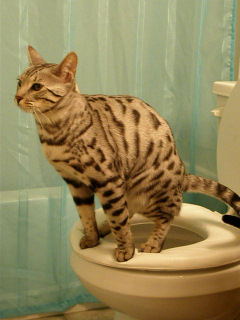Reasons You Mustn't Flush Cat Poop Down Your Toilet - Maintain Your Plumbing Health
Reasons You Mustn't Flush Cat Poop Down Your Toilet - Maintain Your Plumbing Health
Blog Article
Here down the page you can locate some sensible advice in relation to Don’t flush cat feces down the toilet.

Introduction
As feline proprietors, it's vital to bear in mind just how we deal with our feline close friends' waste. While it might seem hassle-free to flush feline poop down the toilet, this practice can have damaging effects for both the environment and human health and wellness.
Ecological Impact
Flushing cat poop introduces unsafe pathogens and bloodsuckers right into the water system, posing a considerable threat to aquatic environments. These impurities can adversely impact aquatic life and compromise water high quality.
Health Risks
Along with ecological concerns, purging pet cat waste can additionally posture health dangers to humans. Pet cat feces may consist of Toxoplasma gondii, a bloodsucker that can create toxoplasmosis-- a possibly extreme ailment, specifically for expectant females and people with damaged immune systems.
Alternatives to Flushing
Thankfully, there are safer and more responsible means to take care of pet cat poop. Think about the following alternatives:
1. Scoop and Dispose in Trash
One of the most typical method of disposing of pet cat poop is to scoop it into an eco-friendly bag and throw it in the trash. Make sure to use a committed litter inside story and deal with the waste without delay.
2. Use Biodegradable Litter
Go with biodegradable feline litter made from materials such as corn or wheat. These clutters are environmentally friendly and can be safely taken care of in the trash.
3. Bury in the Yard
If you have a backyard, consider burying feline waste in a marked location far from vegetable gardens and water sources. Make certain to dig deep sufficient to prevent contamination of groundwater.
4. Mount a Pet Waste Disposal System
Buy a pet dog garbage disposal system particularly designed for pet cat waste. These systems use enzymes to break down the waste, minimizing smell and environmental effect.
Verdict
Responsible animal possession prolongs past offering food and shelter-- it additionally entails proper waste administration. By avoiding flushing cat poop down the bathroom and choosing alternate disposal methods, we can decrease our ecological impact and protect human health and wellness.
Why Can’t I Flush Cat Poop?
It Spreads a Parasite
Cats are frequently infected with a parasite called toxoplasma gondii. The parasite causes an infection called toxoplasmosis. It is usually harmless to cats. The parasite only uses cat poop as a host for its eggs. Otherwise, the cat’s immune system usually keeps the infection at low enough levels to maintain its own health. But it does not stop the develop of eggs. These eggs are tiny and surprisingly tough. They may survive for a year before they begin to grow. But that’s the problem.
Our wastewater system is not designed to deal with toxoplasmosis eggs. Instead, most eggs will flush from your toilet into sewers and wastewater management plants. After the sewage is treated for many other harmful things in it, it is typically released into local rivers, lakes, or oceans. Here, the toxoplasmosis eggs can find new hosts, including starfish, crabs, otters, and many other wildlife. For many, this is a significant risk to their health. Toxoplasmosis can also end up infecting water sources that are important for agriculture, which means our deer, pigs, and sheep can get infected too.
Is There Risk to Humans?
There can be a risk to human life from flushing cat poop down the toilet. If you do so, the parasites from your cat’s poop can end up in shellfish, game animals, or livestock. If this meat is then served raw or undercooked, the people who eat it can get sick.
In fact, according to the CDC, 40 million people in the United States are infected with toxoplasma gondii. They get it from exposure to infected seafood, or from some kind of cat poop contamination, like drinking from a stream that is contaminated or touching anything that has come into contact with cat poop. That includes just cleaning a cat litter box.
Most people who get infected with these parasites will not develop any symptoms. However, for pregnant women or for those with compromised immune systems, the parasite can cause severe health problems.
How to Handle Cat Poop
The best way to handle cat poop is actually to clean the box more often. The eggs that the parasite sheds will not become active until one to five days after the cat poops. That means that if you clean daily, you’re much less likely to come into direct contact with infectious eggs.
That said, always dispose of cat poop in the garbage and not down the toilet. Wash your hands before and after you clean the litter box, and bring the bag of poop right outside to your garbage bins.
https://trenchlesssolutionsusa.com/why-cant-i-flush-cat-poop/

I recently found that piece of writing on Don’t flush cat feces down the toilet when looking around the web. If you appreciated our article kindly make sure you remember to pass it around. Many thanks for going through it.
More Details Report this page